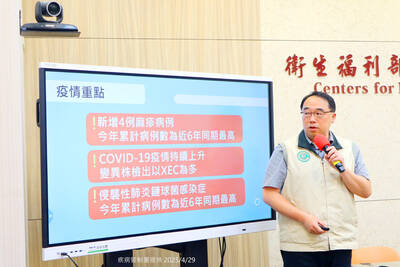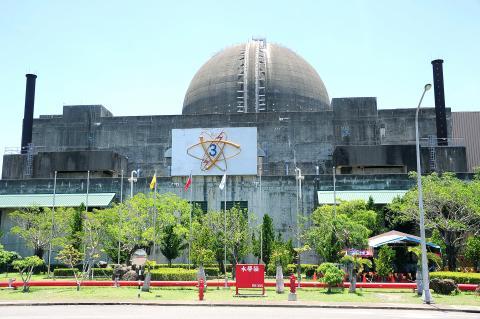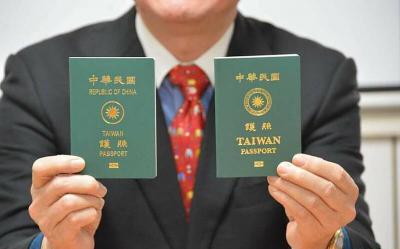A colonel working for the National Security Bureau (NSB) claims he was illegally placed under surveillance concerning matters of national security and that the intelligence agency did not follow legal procedural processes.
Colonel Wu Chao-han (吳兆漢) said in a lawsuit submitted to the Shihlin District Court (士林) recently that the bureau had monitored him on unsubstantiated charges and had not informed him that its surveillance operation had been terminated until December last year.
Wu is suing National Security Bureau Director-General Tsai De-sheng (蔡得勝) and other officials for psychological trauma and is demanding NT$10 million (US$341,000) in compensation, with NT$50,000 of the requested amount to be paid first for the agency’s failure to inform Wu it had terminated its observation of his movements.
The Shihlin District Court held a hearing on Sept 12 where Tsai and the other defendant, Hou Shui-yuan (侯水源), the bureau’s internal security department chief, were represented by their lawyers. The judge presiding over the case opted to access information and documents from the Taipei Military Police before fixing a date for the court to convene.
According to exclusive information received by the Liberty Times (the Taipei Times’ sister newspaper), Wu had been placed under surveillance by the bureau under Article 7 of the Communication Security and Surveillance Act (通訊保障及監察法) with the operation being carried out by the military police’s Taipei Headquarters.
Article 7 of the act states that “to avoid harm to national security, the state’s head of intelligence gathering may issue surveillance on the below listed methods of communication to gather necessary intelligence on foreign powers or enemies,” meaning that the surveillance was targeting “the communication of agents of foreign powers and enemies.”
The information said the bureau had issued two surveillance notices to Wu, encompassing the timeframe between August 2007 and September 2008, during which time Wu’s calls were monitored and recorded.
A box on the delayed surveillance termination form which was served to Wu and which outlined whether the government had located any information during its surveillance operation, had been checked, papers indicated.
Wu’s friend, and the owner of the Voice of Taiwan radio station, Hsu Jung-chi (許榮棋), said that placing Wu under surveillance using that clause in the law was the equivalent of saying that Wu was “a traitor,” yet this was completely unsubstantiated.
If there were any doubts about Wu’s loyalty, then why had the colonel been allowed to remain in the employment of the bureau, Hsu asked.
Several bureau officials reportedly asked Wu not to complicate matters and said “he deserved” to be investigated, Hsu added, saying the incident was a roll back of Taiwan’s democracy and its human rights.
The timeframe during which Wu was placed under surveillance spanned both the administrations of former president Chen Shui-bian (陳水扁) and President Ma Ying-jeou (馬英九), but “Ma said in his 2008 inaugural address that he would not allow any illegal surveillance during his presidency, while Tsai told the legislature on Oct. 19 that if there were illegal surveillance [under his watch], he would resign,” Hsu said.
Ma should solve the issue immediately and look into whether the bureau had violated the law, Hsu said. The government should now implement justice for Wu and clear his name, he added.
Meanwhile, Shi Hwei-yow (許惠祐), the secretary-general who ordered Wu be placed under surveillance, said that in accordance with the act, surveillance targeting any residents within the borders of the Republic of China must first be approved by the legislature.
It could not be done by the bureau alone, Shi said, adding that while he was not clear on the details of the case, he was certain it was because counterintelligence units felt the measure was necessary. The bureau followed due legal procedure, Shi said.
The bureau yesterday said that surveillance had been authorized by the Taiwan High Prosecutor’s Office and that the authorization did not come during the Ma administration.
The whole surveillance incident followed legal procedures including the notification of the surveyed person, the bureau said.
The bureau said that as Wu’s litigation against it is now entering a judicial process, the bureau would respect any decision made by the courts.
Additional reporting by Tzou Jiing-wen

A fugitive in a suspected cosmetic surgery fraud case today returned to Taiwan from Canada, after being wanted for six years. Internet celebrity Su Chen-tuan (蘇陳端), known as Lady Nai Nai (貴婦奈奈), and her former boyfriend, plastic surgeon Paul Huang (黃博健), allegedly defrauded clients and friends of about NT$1 billion (US$30.66 million). Su was put on a wanted list in 2019 when she lived in Toronto, Canada, after failing to respond to subpoenas and arrest warrants from the Taipei District Prosecutors’ Office. Su arrived at Taiwan Taoyuan International Airport at 5am today on an EVA Air flight accompanied by a

COVID-19 infections have climbed for three consecutive weeks and are likely to reach another peak between next month and June, the Centers for Disease Control (CDC) said yesterday. Weekly hospital visits for the disease increased by 19 percent from the previous week, CDC Epidemic Intelligence Center Director Guo Hung-wei (郭宏偉) said. From Tuesday last week to yesterday, 21 cases of severe COVID-19 and seven deaths were confirmed, and from Sept. 1 last year to yesterday, there were 600 cases and 129 deaths, he said. From Oct. 1 last year to yesterday, 95.9 percent of the severe cases and 96.7 percent of the deaths

Restarting the No. 2 reactor at the Ma-anshan Nuclear Power Plant would take up to 18 months, Minister of Economic Affairs J.W. Kuo (郭智輝) said today. Kuo was answering questions during a meeting of the Legislative Yuan’s Economics Committee, where legislators are considering amendments to the Renewable Energy Development Act (再生能源發展條) amid concerns about the consequences of the Pingtung County reactor’s decommissioning scheduled for May 17. Its decommissioning is to mark the end of Taiwan’s nuclear power production. However, Chinese Nationalist Party (KMT) lawmakers have proposed an amendment to the Nuclear Reactor Facilities Regulation Act (核子反應器設施管制法) that would extend the life of existing

The Ministry of Foreign Affairs yesterday demanded that Somalia reverse its decision prohibiting Taiwanese passport holders from entering or transiting through the country. Somalia said it is following the “one China” principle based on UN Resolution 2758. The ministry said that Somalia is misinterpreting the resolution under China’s instigation, creating a false impression that Taiwan is subordinate to China. The Somali Civil Aviation Authority told airlines on Tuesday last week that starting today, any passengers with passports or travel documents issued from Taiwan or its affiliated institutions would not be allowed to enter or transit through Somalia. The decision comes as Taiwan is boosting